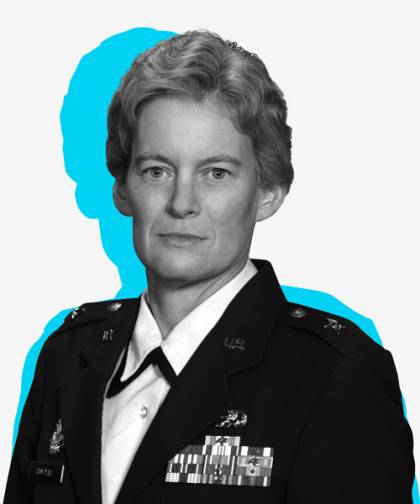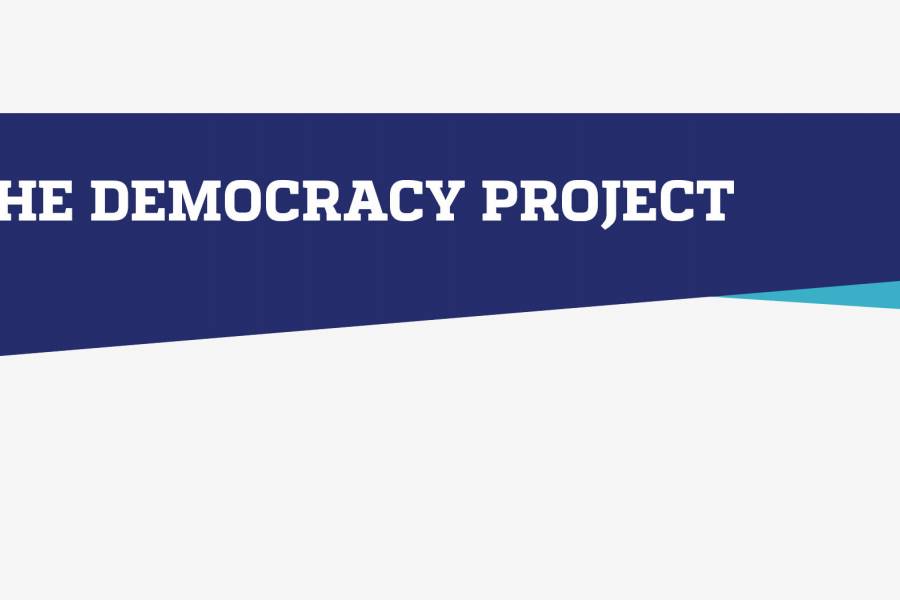
Image caption:Paula Thornhill is associate director of the Strategic Studies program at Johns Hopkins SAIS and associate professor of the practice. Prior to joining the school she was a senior political scientist at the RAND Corporation and director of the Strategy and Doctrine Program within RAND Project AIR FORCE. Thornhill retired from the U.S. Air Force as a brigadier general in 2009.
The United States military has a long tradition of being apolitical. Paula Thornhill believes it must remain that way.
Thornhill, a retired U.S. Air Force brigadier general and current associate director of the Strategic Studies program at the Johns Hopkins School of Advanced International Studies, has spent the better portion of her life in the military, as a commander, strategist, and educator. She also spent 10 years as a senior political scientist at the RAND Corporation looking at a variety of military issues.
The Hub spoke with Thornhill about the intersection of politics and the military, and the concerns—or even the perception—that those in uniform may be taking sides in an election.
At this point in time, what is your greatest hope and fear about the future of democracy?
My first thought is, if as citizens in a democracy we are not always worried about its fate, then we have a problem. Because it's the responsibility of every citizen to retain and sustain the health of that republic, and the institutions that make it work. Any time we're not worried about it, then I think that democracy is at risk.
[Political theorist] Isaiah Berlin said it much better than I ever could, and I'm paraphrasing: When you make an individual choice, are you making the individual choice on your behalf, or on behalf of the greater good? COVID-19 seems to highlight the fact that a lot of folks are making individual choices that maximize goodness for the individual rather than the collective, and that worries me. The second thing that worries me is that whether you call it truth decay or alternative facts, our baseline for facts has been cast in doubt. If you don't have a common baseline, you have a problem. Finally, a third issue is the growing sense that many Americans no longer feel they are a part of something larger than themselves. Here, I'm talking about encouraging national service in the broadest sense. We need an encompassing notion of service that helps every citizen connect with the nation in a way that goes beyond personal interests.
Leaning on your expertise and background, how insulated is the U.S. military from political matters, and what role can and does the military play in preserving democracy?
Senior serving military officers want to keep the military out of politics; at some times that takes more effort than at others. Take, for example, the most recent debate started by John Nagl and Paul Yingling that the military needs to be ready to remove President Trump if he loses the election and refuses to leave the White House. That's not going to happen. Gen. Mark A. Milley, the chairman of the Joint Chiefs of Staff, and the senior military leaders are very attuned to their constitutional and legal responsibilities. For the military to intervene could be misconstrued as a coup. For all its flaws, and the U.S. military has them, I have a deep confidence that it would step back and look to civilian leadership in Congress, the judiciary, and elsewhere in the executive branch to resolve the issue.
You have written that the military needs to maintain the trust of the American people, and you were concerned how it looked that Gen. Milley took part in—if just by his presence—the events of June 1 when police and National Guard troops used tear gas, rubber bullets, and other riot control tactics to forcefully clear peaceful protesters from Lafayette Square in Washington and surrounding streets, creating a path for President Trump and senior administration officials to walk from the White House across the street to St. John's Episcopal Church. Gen. Milley later apologized and admitted his error of judgment. How ingrained is this, that people in uniform cannot be seen as adversaries to the people or aligned to any political party?
First, that scene in June was just awful and still concerns me. The second thing I would say is, any institution that thinks it's above being corrupted or being abused is just wrong. So yes, it does concern me that a national leader could create tension between the institution and the population it serves, which would cause the American people to lose trust in the military.
One of the things that I think is so important to understand is how much power the president has as commander in chief. We need to re-look at that, in my opinion. The president, any president, just has way too much control.
How should a military operate in a democracy? As you say, the president is commander in chief, but Congress has a say in military matters, as does the civilian leader, the secretary of defense.
This is a great question. One of the questions Americans might want to ask is how broad of a writ do we want to give the military? Take for example the recent creation of the Space Force. What on earth is the Space Force doing in the Department of Defense when you look at what it's being asked to do? The more things that you put into the Department of Defense, the more you empower the president as commander in chief, who has unique authorities over those institutions. I think this is part of a larger institutional and governance problem that's emerging.
Is there any recent noncombat use of the military, even indirectly, by an administration where you stood back and said, that just cannot be allowed to happen?
For me, parading in D.C. on the Fourth of July, calling cadets back to West Point to graduate in the middle of COVID-19, and taking an entourage to St. John's Episcopal Church all fit into this category.
What gives you hope that our democracy will remain strong and prevail into 2021 and beyond?
Every time I am around junior service members, whether they are enlisted or officer, they give me great hope. They get that they're part of something bigger than themselves, and that it's up to them to fix some of these big problems, whether it's addressing systemic racial injustice or executing complex missions. The maturity that you see in these teenagers and 20-somethings in uniform is awe inspiring.
Also, our history is a fraught history. As we look back, we recognize that we're all on a journey, we're all human, and we're all imperfect. But maybe we can come out of this moment in our history a little bit better than we went into it. I think one of the things that oddly gives me hope is that the 2016 election and the Trump administration have revealed how fragile some of our institutions are. The first part of solving a problem is understanding you have one in the first place. It's not an easy one to fix, but at least the fragility has been identified and we need all of us, as citizens, to focus on fixing it.
About The Democracy Project
The future of democracy as a system of government is increasingly uncertain. With a rise of populist forces globally and many existing democracies in regression, liberty itself seems under assault. In the United States, a diminished or warped democracy could have far-reaching repercussions for voting rights, the rule of law, education, the application of science, immigration, citizenship, and long-held societal norms we take for granted.
As we near an election in which many of the defining principles of democracy seem to hang in the balance, an array of Johns Hopkins experts will share their greatest hopes, their deepest fears, and their informed insights on the state of America's democratic experiment. Read more from The Democracy Project
Posted in Voices+Opinion, Politics+Society









